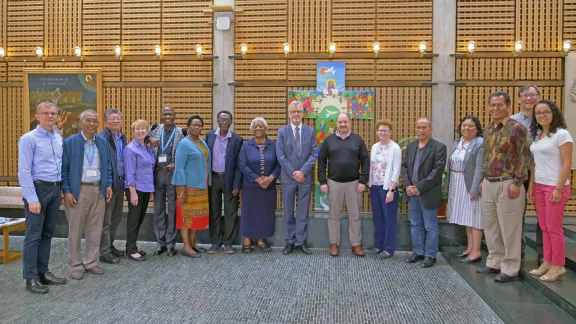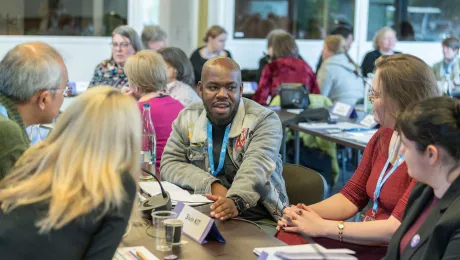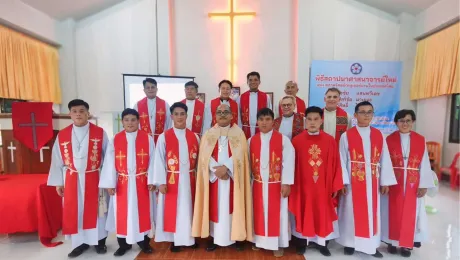
Participants of the 2019 Retreat of Newly Elected Leaders with LWF General Secretary Rev Dr Martin Junge and LWF Area Secretaries. Photo: LWF/C. Kästner
2019 Retreat of Newly Elected Leaders shows similar joys and challenges in Lutheran churches worldwide
(LWI) - To be the church is to care for people in need. This was one of the main observations when eleven recently elected Lutheran church leaders met in Geneva and Wittenberg, to exchange about their churches, discuss challenges and good practice-examples and get to know the wider LWF communion. They come from nine countries and four continents.
In addition to discussions on pastoral ministry, leadership, gender justice and conflict management, a large part of the meeting was dedicated to presentations by the participants, who shared what it means to be church in their context, challenges and how they address them. Sustainability, diakonia and witnessing in an increasingly polarized context were an important part of the discussion.
Polarized contexts
Mission in the context of hate and violence was the main topic of the presentation of Bishop Sulen Narzary of the Northern Evangelical Lutheran Church in India, which on top of being ethnically diverse itself is witnessing in an often hostile minority context. His church counters such dividing tendencies by working for unity and focusing on prayer, as well as continuing to “present the gospel.”
Bishops from the United States described their context as less threatening to church members and clergy, but no less polarized. Pastors work hard to counter narratives of hate and exclusion, said Bishop Susan Briner of the Evangelical Lutheran Church in America (ELCA) Southwestern Texas Synod. She shared how she has brought church leaders to the Mexican border, the aim being to revisit own ideas and (pre-)conceptions about immigrants, to meet and speak to “real” people and to spread the word of their encounters with them back home in their congregations.
Embrace the alienated and marginalized
Diakonia and advocacy are vital parts of Lutheran ministry worldwide, said many of the church leaders. “Diakonia is the new language of grace. When serving, everybody gains,” Rev. Leonardo Schindler, Pastor President of the Evangelical Church of the River Plate said.
Many leaders found the call to diakonia directly on their doorsteps, also defining their understanding of mission: Congregations in the United States are sheltering migrants and supporting families in need, Lutherans in Ghana support families in rural areas, the Lutheran Church in Peru welcomes refugees from Venezuela.
Diakonia is the new language of grace. When serving, everybody gains.
Feed spiritual hunger
“Churches should be communities that embrace the alienated people in our society, and share God’s love with them,” Bishop Eun Seob Kim of the Lutheran Church in Korea said, detailing how the economic growth of the country had led people to leave families in the countryside and move to megacities where they did not have any social attachments. Churches in the past often filled that gap, becoming a new family and social network.
Lately however, Lutherans in South Korea face a decreasing and aging membership - again, an observation shared by many participants in their own churches. Attracting young people has become a challenge. Rev John Shadrack Donkoh explained how in the Evangelical Lutheran Church of Ghana, one third of pastors will be retiring in the near future. He has made it a priority to train young pastors. 40 young women are attending a training for deaconesses in the church ministry.
While the situation in Ghana is especially dire, education and spiritual depth were also identified as the best ways to counter the lure of well-resourced mega churches and other offers for spiritual well-being, which Lutherans in North America, Korea and Argentina are competing with for their young church members. “We have failed to see their spiritual hunger,” the Korean bishop Kim very critically said. “We never tried to have a serious conversation about the issues they have tried to settle.”
More than financial resources
“It is interesting that despite being so different in resources and membership, we all face the same issues,” Bishop Deborah Hutterer of the ELCA Grand Canyon Synod observed. “This tells us that having money does not solve the problem!”
“Finance should not be the only thing that matters, we have many gifts to offer!” Pastor President German Loayza Aslla from the Bolivian Evangelical Lutheran Church added. “As long as we are close to people, we are close to God. We need to be a church for others, not for ourselves.”


